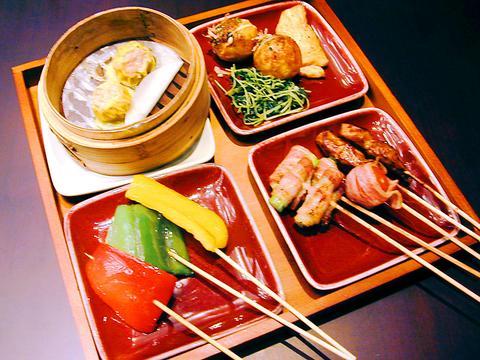Wasabi is actually two different restaurants located next door to one another in the Taipei 101 Mall, a dining bar and a buffet. This review regards the buffet. While the two share the same kitchen and staff and even several dishes, they are distinct dining experiences. The dining bar is a straightforward restaurant, but the buffet is billed as a "Japanese food festival." It's an appropriate billing.
The Formosa Regent Hotel, which owns and operates Wasabi, has essentially brought a Japanese night market indoors and made it upscale. That is, as upscale as a buffet can be made. There is a kind of wide-eyed ravenousness among all buffet-goers, and even the highbrow mall patrons who perambulate into Wasabi quickly start salivating and circling the buffet areas. The fact that they're in a sleek interior of dark woods and vertical louver walls and carrying elegant flatware makes them look no less like a pack of dogs. It's not surprising, given all that's on offer.
The first buffet area is a fisherman's haul of shrimp, sushi, sashimi and fish-egg rolls prepared fresh on the other side of the counter and laid in individual wicker baskets.

PHOTO: DAVID MOMPHARD, TAIPEI TIMES
But plan accordingly; there are four other buffets. One includes large fried octopus balls and all manner of grilled things. Of note are the bacon-wrapped cherry tomatoes and asparagus, but be sure to ask for items fresh from the grill. Another area offers a variety of noodles too numerous to name and another offers dim sum, several bite-sized desserts and fruit, including mangosteens with the tops cut off. I forgot a spoon but was quickly brought one by a staffer who noticed me trying to suck my mangosteen's insides out.
Since you're already feeding from the trough, go ahead and be a pig. Dish up a bowl of Movenpick ice cream and choose your topping. Don't forget a coffee or cappuccino available at the push of a button.
There are, by most accounts, too many items here to sample in one sitting. But the bottom line is whether a buffet -- even one this good -- is worth NT$800. If you're hungry and in the mood to spend a couple hours sampling everything from soba noodles to candy-coated shrimp -- or if you're a fan of sushi and sashimi -- it's worth it (at least it feels so afterward). If you're not in the "food festival" mood, save yourself a bit of cash and step next door.

April 14 to April 20 In March 1947, Sising Katadrepan urged the government to drop the “high mountain people” (高山族) designation for Indigenous Taiwanese and refer to them as “Taiwan people” (台灣族). He considered the term derogatory, arguing that it made them sound like animals. The Taiwan Provincial Government agreed to stop using the term, stating that Indigenous Taiwanese suffered all sorts of discrimination and oppression under the Japanese and were forced to live in the mountains as outsiders to society. Now, under the new regime, they would be seen as equals, thus they should be henceforth

Last week, the the National Immigration Agency (NIA) told the legislature that more than 10,000 naturalized Taiwanese citizens from the People’s Republic of China (PRC) risked having their citizenship revoked if they failed to provide proof that they had renounced their Chinese household registration within the next three months. Renunciation is required under the Act Governing Relations Between the People of the Taiwan Area and the Mainland Area (臺灣地區與大陸地區人民關係條例), as amended in 2004, though it was only a legal requirement after 2000. Prior to that, it had been only an administrative requirement since the Nationality Act (國籍法) was established in

Three big changes have transformed the landscape of Taiwan’s local patronage factions: Increasing Democratic Progressive Party (DPP) involvement, rising new factions and the Chinese Nationalist Party’s (KMT) significantly weakened control. GREEN FACTIONS It is said that “south of the Zhuoshui River (濁水溪), there is no blue-green divide,” meaning that from Yunlin County south there is no difference between KMT and DPP politicians. This is not always true, but there is more than a grain of truth to it. Traditionally, DPP factions are viewed as national entities, with their primary function to secure plum positions in the party and government. This is not unusual

US President Donald Trump’s bid to take back control of the Panama Canal has put his counterpart Jose Raul Mulino in a difficult position and revived fears in the Central American country that US military bases will return. After Trump vowed to reclaim the interoceanic waterway from Chinese influence, US Defense Secretary Pete Hegseth signed an agreement with the Mulino administration last week for the US to deploy troops in areas adjacent to the canal. For more than two decades, after handing over control of the strategically vital waterway to Panama in 1999 and dismantling the bases that protected it, Washington has